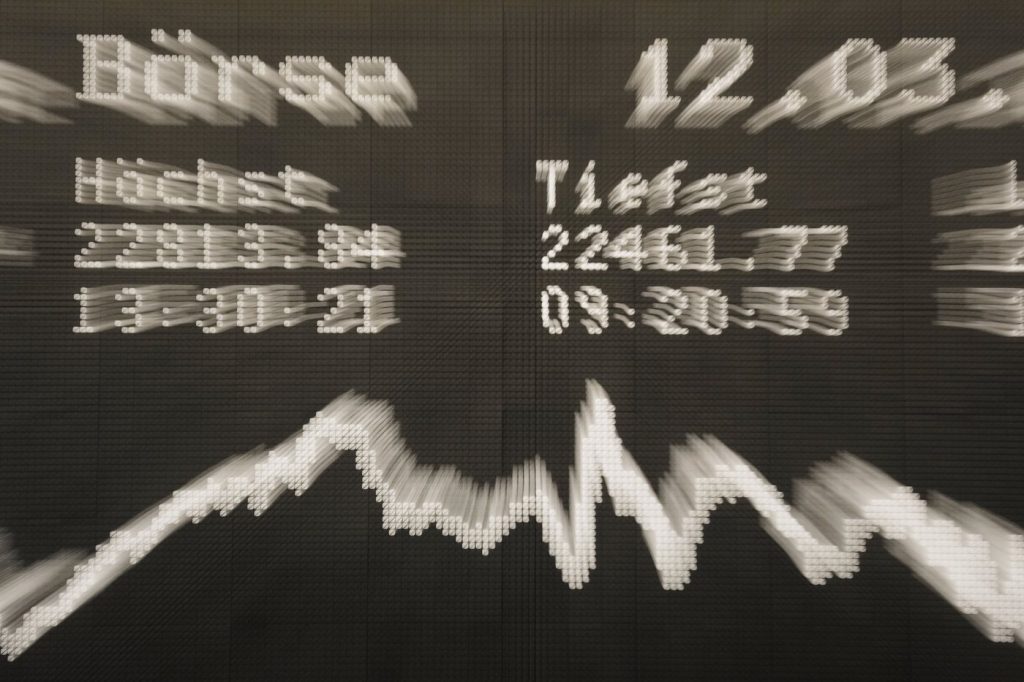BANGKOK (AP) - Asian shares traded mostly lower on Thursday, mirroring a mixed performance on Wall Street, which experienced a rebound following a positive update on U.S. consumer prices. Despite this, U.S. futures fell, and oil prices remained relatively unchanged.
In China, the markets were down as investors remained cautious about the ongoing trade tensions initiated by President Donald Trump's administration. Hong Kong's Hang Seng index decreased by 0.7%, settling at 23,426.80, while the Shanghai Composite index fell 0.4% to 3,357.02. Conversely, Tokyo’s Nikkei 225 saw a minor increase of 0.5%, closing at 37,014.82. South Korea's Kospi dipped slightly by 0.1% to 2,573.05, and Australia’s S&P/ASX 200 dropped 0.4% to 7,756.10.
Taiwan's Taiex also fell by 0.4%, while the Sensex in India edged up by 0.1%. Bangkok's SET experienced a minimal slip of 0.1%. On Wall Street, the S&P 500 gained 0.5% to reach 5,599.30 on Wednesday, after fluctuating between an early gain of 1.3% and a subsequent loss. This volatility occurred a day after the index had briefly fallen over 10% below its all-time high achieved last month.
The Dow Jones Industrial Average exhibited volatility as well, ultimately closing down 0.2% at 41,350.93, while the Nasdaq composite registered a significant climb of 1.2% to 17,648.45. The recent inflation report indicated that overall prices increased less than expected for U.S. consumers last month, which contributed to the varied market responses.
Stocks in the artificial intelligence sector were among the leaders in gains, rebounding after experiencing significant declines due to exorbitant price concerns. Notably, Nvidia shares rose by 6.4%, reducing its year-to-date loss to 13.8%. Additionally, Super Micro Computer's stock climbed 4%, and GE Vernova, which is involved in powering AI data centers, gained 5.1%.
On a contrasting note, Tesla, led by Elon Musk, saw a 7.6% increase in its stock price, marking its first consecutive gain in nearly a month, after previously witnessing a drastic decline of more than half since mid-December. However, the overall trend within the S&P 500 remained negative with more stocks declining than gaining. Businesses likely to be affected by the trade war showed notable losses; for example, Brown-Forman, known for Jack Daniel's whiskey, dropped 5.1%, and Harley-Davidson fell 5.7%.
These companies are among those that the European Union is targeting with tariffs in response to Trump's imposition of 25% tariffs on steel and aluminum, which took effect recently. The retaliatory tariffs from Canada additionally targeted U.S. tools, sports equipment, and other goods.
EU President Ursula von der Leyen expressed regret over these measures, stating, "Tariffs are taxes. They are bad for business, and worse for consumers." The overarching question remains about the economic impact of Trump's trade policies and tariffs. Even potential mild tariff implementations may have adverse effects, given the ongoing uncertainty and the ripple effects on consumer and business confidence, likely leading to reduced spending.
In light of these market fluctuations, warnings have been issued about the potential increase in prices due to importers passing on costs resulting from tariffs, further aggravating inflation concerns. This inflation report coincides with the Federal Reserve's cautious stance on interest rates, having previously cut rates last year to stimulate growth amidst persistent inflation worries.
In early trading on Thursday, U.S. benchmark crude oil fell by 11 cents to $67.57 per barrel, while Brent crude, the international standard, lost 5 cents, settling at $70.90 per barrel. The U.S. dollar depreciated against the Japanese yen, falling to 147.88 from 148.25 yen. Conversely, the euro slightly appreciated to $1.0889 from $1.0887.
AP Business Writer Stan Choe contributed to this report.










